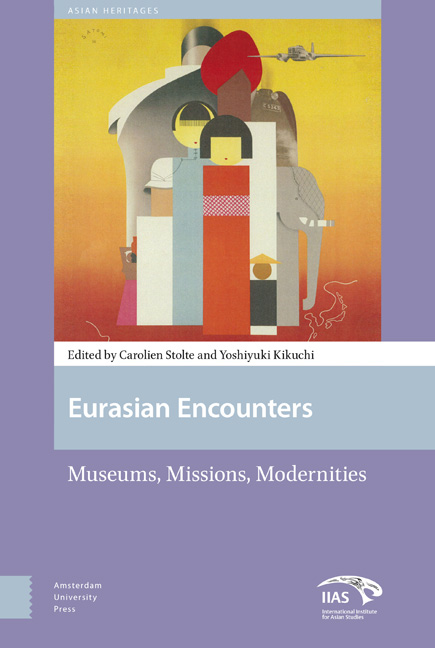Book contents
- Frontmatter
- Contents
- 1 Eurasian Encounters: Cross-border Intellectual and Cultural Exchange, 1900-1950
- Part I Artistic Spaces
- 2 The Museum at Aundh: Reflecting on Citizenship and the Art Museum in the Colony
- 3 Exhibiting the Nation: Cultural Flows, Transnational Exchanges, and the Development of Museums in Japan and China, 1900-1950
- 4 Parallel Tracks: Pan Yuliang and Amrita Sher-Gil in Paris
- 5 Bauhaus and Tea Ceremony: A Study of Mutual Impact in Design Education between Germany and Japan in the Interwar Period
- Part II Missions and Education
- 6 Schooling a Missionary in Early Twentieth-Century Eastern India
- 7 The Catholic Church in China in the First Half of the Twentieth Century: The Establishment of Zhendan University and Furen University
- Part III Shared Trajectories, New Subjectivities
- 8 Indigenizing Cosmopolitanism: Shifting Metropolitan Subjectivities in Twentieth-century Colombo
- 9 Fighting for the Soviet Empire: War Propaganda Production and Localized Discourses on Soviet Patriotism in Uzbekistan during the Second World War
- 10 Shared Origins, Shared Outcomes?: Transcultural Trajectories of Germany and Japan during the Asia-Pacific War
- Index
8 - Indigenizing Cosmopolitanism: Shifting Metropolitan Subjectivities in Twentieth-century Colombo
Published online by Cambridge University Press: 12 December 2020
- Frontmatter
- Contents
- 1 Eurasian Encounters: Cross-border Intellectual and Cultural Exchange, 1900-1950
- Part I Artistic Spaces
- 2 The Museum at Aundh: Reflecting on Citizenship and the Art Museum in the Colony
- 3 Exhibiting the Nation: Cultural Flows, Transnational Exchanges, and the Development of Museums in Japan and China, 1900-1950
- 4 Parallel Tracks: Pan Yuliang and Amrita Sher-Gil in Paris
- 5 Bauhaus and Tea Ceremony: A Study of Mutual Impact in Design Education between Germany and Japan in the Interwar Period
- Part II Missions and Education
- 6 Schooling a Missionary in Early Twentieth-Century Eastern India
- 7 The Catholic Church in China in the First Half of the Twentieth Century: The Establishment of Zhendan University and Furen University
- Part III Shared Trajectories, New Subjectivities
- 8 Indigenizing Cosmopolitanism: Shifting Metropolitan Subjectivities in Twentieth-century Colombo
- 9 Fighting for the Soviet Empire: War Propaganda Production and Localized Discourses on Soviet Patriotism in Uzbekistan during the Second World War
- 10 Shared Origins, Shared Outcomes?: Transcultural Trajectories of Germany and Japan during the Asia-Pacific War
- Index
Summary
Abstract
During the first half of the twentieth century, pressured by political transformations, metropolitan loyalties gradually shifted across colonial and nationalist ideological lines, wartime alliances and Cold-War dialectic. In early postcolonial Asia, and more specifically in Ceylon/Sri Lanka, definitions of cosmopolitanism were accordingly transformed from a studied mimicry of colonial habits to new strategies for indigenizing the colonial legacy. In architecture, these transformations were captured in the institutional architecture of the era: those produced to gain legitimacy, the patronizingly Indic styles of the colonial Public Works Department, and the new nationalist architecture. In each of these stylistic phases, particular attributes of cosmopolitanism were advanced or erased, while indigenous motifs were applied as embellishments. These processes involved a range of reformers, who drew on European artistic developments and Indic architectural styles. These cosmopolitan interactions eventually produced late colonial experimentation with vernacular aesthetics and subsequent movements for indigenization.
Renewed attention to theories of cosmopolitanism at the start of the new millennium, in the works of Bruce Robbins and Pheng Cheah, Craig Calhoun, Anthony Appiah, David Harvey, and others, responded to what we might describe as the post-national and neo-liberal tenor of political and economic life at the end of the Cold War. The failure of idealized liberal agendas and their histories of violence posed new challenges for strategies of governance. These authors referenced nineteenth-century nationalist ideologies of regionalism and cosmopolitanism that underwrote twentieth-century hostilities and offered cautionary insights into what decentralization, porous boundaries, and immigrant labour flows may mean for human-rights discourse. They exposed the human cost of economic liberalization against the celebratory advance of marketization.
Whereas these discussions occurred against the backdrop of European unification, postcolonial scholars like Carol Breckenridge, Sheldon Pollock, Homi Bhabha, and Dipesh Chakrabarty, alerted us to cosmopolitanisms occurring elsewhere, at the margins of Europe and America, reminding us of colonial and nationalist histories of like phenomena. Whereas ideas of cosmopolitanism were typically associated with the activities of a comprador class, produced by colonial education, the first generation of nationalist leaders emerged from within their ranks. The struggle for independence and the parallel processes of decolonization occurring as they did at the height of Cold-War hostilities lent a regionalist tenor to national politics, adversarial to ‘Western’ cosmopolitan values.
- Type
- Chapter
- Information
- Eurasian EncountersMuseums, Missions, Modernities, pp. 179 - 206Publisher: Amsterdam University PressPrint publication year: 2017



